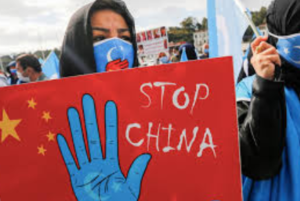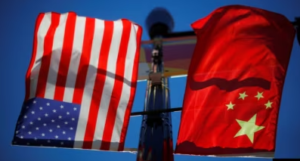In a significant move signaling the ongoing tensions between the United States and China, the U.S. government has added two Chinese companies to a trade blacklist over serious allegations of forced labor in the Xinjiang Uyghur Region. This action, which expands the list of entities prohibited from importing goods produced in Xinjiang, comes amid escalating scrutiny of China’s human rights record and a retaliatory investigation launched by Beijing against American firms.
New Additions to the Blacklist
On October 2, 2024, the Department of Homeland Security (DHS) announced that a Chinese steel manufacturer and an artificial sweetener producer have been placed on the Uyghur Forced Labor Prevention Act (UFLPA) Entity List. This list, which now includes 75 entities, is designed to prevent imports believed to be produced, in whole or in part, through the exploitation of Uyghurs and other ethnic minorities in Xinjiang.“Today’s actions reaffirm our commitment to eliminating forced labor from U.S. supply chains and upholding our values of human rights for all,” stated Robert Silvers, Under Secretary for Policy at DHS. This declaration underscores the U.S. government’s intent to tackle human rights abuses tied to international trade, emphasizing that no sector is exempt from scrutiny.Broader Implications of the UFLPAThe UFLPA was enacted in December 2021, fueled by mounting evidence suggesting that the Chinese government has been detaining and exploiting Uyghurs, a predominantly Muslim population, as well as other ethnic and religious minorities in the Xinjiang region. In recent years, there has been a heightened focus on the cotton and textile industries, with many companies previously added to the list having direct ties to these sectors.The latest additions mark a notable expansion of the UFLPA’s scope, indicating that even industries outside textiles are not immune to scrutiny. “We will continue to identify entities across industries and hold accountable those who seek to profit from exploitation and abuse,” Silvers affirmed.
The Retaliatory Response from China
As the U.S. ramps up its enforcement of human rights-related trade policies, China has responded with its own set of measures. Last week, Beijing initiated an investigation into PVH Corp, the parent company of popular fashion brands like Tommy Hilfiger and Calvin Klein. This investigation focuses on alleged discriminatory practices against Xinjiang cotton producers, suggesting a defensive posture from China amid increasing pressures from U.S. policy.According to state-run media reports, China’s Ministry of Commerce suspects PVH of “violating normal market trading principles” by boycotting Xinjiang products without substantiated claims. PVH has been given 30 days to respond, and failure to do so could result in the company being added to China’s “unreliable entities” list, which carries significant repercussions including trade restrictions.

The Broader Context of U.S.-China Relations
The addition of companies to the UFLPA Entity List reflects the deteriorating relations between the U.S. and China, which have been strained over various issues, including trade, technology, and human rights. This blacklist has become a critical factor in the ongoing trade decoupling between the world’s two largest economies.China has previously targeted American firms, including defense contractors like Lockheed Martin and Raytheon, placing them on its entity list for business dealings related to Taiwan. The reciprocal nature of these actions highlights the complexities and tensions in U.S.-China trade relations.
Global Trends Against Forced Labor
As the U.S. takes steps to combat forced labor, the European Union is also moving toward more stringent regulations. The EU has endorsed new laws aimed at banning products made with forced labor, requiring major corporations to conduct human rights and environmental audits of their overseas suppliers. Taiwan is reportedly considering legislation similar to the UFLPA, further indicating a global shift toward accountability in supply chains.These collective actions represent a growing consensus among Western nations regarding the need to address human rights violations in global trade practices. The increasing focus on ethical sourcing and compliance may force companies worldwide to reevaluate their supply chains and business practices.The U.S. government’s recent actions serve as a reminder of the significant ethical and legal challenges facing multinational corporations operating in or sourcing from China. As accusations of forced labor continue to arise, businesses must navigate a complex landscape of regulatory compliance and consumer expectations regarding human rights.In light of these developments, companies must remain vigilant in their operations and ensure that their supply chains are free from exploitation. This includes conducting thorough due diligence on suppliers, fostering transparency, and committing to ethical sourcing practices.
New Additions to the Blacklist
On October 2, 2024, the Department of Homeland Security (DHS) announced the addition of a Chinese steel manufacturer and an artificial sweetener producer to the Uyghur Forced Labor Prevention Act (UFLPA) Entity List. This list, now comprising 75 entities, is a crucial tool designed to prohibit imports produced, in whole or in part, through forced labor involving Uyghurs and other ethnic minorities in Xinjiang.
Robert Silvers, Under Secretary for Policy at DHS, emphasized the administration’s commitment to human rights by stating, “Today’s actions reaffirm our commitment to eliminating forced labor from U.S. supply chains and upholding our values of human rights for all.” This declaration not only reinforces the U.S. stance against forced labor but also underscores the potential repercussions for companies that fail to comply with ethical standards.
Broader Implications of the UFLPA
The UFLPA, enacted in December 2021, emerged from growing evidence of human rights abuses in Xinjiang, where allegations of mass detentions and forced labor practices have drawn international condemnation. The UFLPA serves as a legal framework to prevent U.S. companies from benefiting from these violations.
Previously, many firms added to this list were primarily involved in the textile and cotton industries. However, the recent additions signify a broader application of the UFLPA, suggesting that no sector is immune from scrutiny. “No sector is off-limits. We will continue to identify entities across industries and hold accountable those who seek to profit from exploitation and abuse,” Silvers stated.
The Retaliatory Response from China
In response to the U.S. actions, Beijing has ramped up its own measures, notably launching an investigation into PVH Corp, which owns popular brands such as Tommy Hilfiger and Calvin Klein. The Chinese government alleges that PVH has engaged in discriminatory practices against Xinjiang cotton producers. State-run media reported that China’s Ministry of Commerce is scrutinizing PVH for allegedly violating market principles by boycotting Xinjiang products without a factual basis.
PVH has 30 days to respond to this investigation, and failure to comply could lead to being placed on China’s “unreliable entities” list. Such a designation could impose severe restrictions and penalties, further complicating PVH’s operations in one of its largest markets.
The Broader Context of U.S.-China Relations
The decision to add companies to the UFLPA Entity List is part of a broader strategy to counter China’s human rights violations while addressing economic competitiveness. The relationship between the two nations has deteriorated in recent years, with trade disputes, technology restrictions, and geopolitical tensions escalating.
China has retaliated against U.S. firms before, including placing defense contractors like Lockheed Martin and Raytheon on its entity list for their dealings related to Taiwan. The reciprocal nature of these actions illustrates the growing complexity of U.S.-China economic interactions.
Global Trends Against Forced Labor
The U.S. is not alone in its efforts to combat forced labor. The European Union is also advancing regulatory frameworks aimed at banning products linked to forced labor. New laws in the EU will require large firms to conduct human rights and environmental audits of their overseas suppliers, reinforcing the commitment to ethical sourcing practices.
Similarly, Taiwan is considering legislation akin to the UFLPA, indicating a global trend toward increased scrutiny and accountability in supply chains. These developments reflect a collective recognition that addressing human rights abuses is critical for sustainable economic growth.
The Road Ahead
As the U.S. government intensifies its enforcement against forced labor, the implications for multinational corporations are profound. Businesses operating in or sourcing from China must navigate a complex landscape of regulatory compliance and consumer expectations regarding ethical practices.
To avoid penalties and reputational damage, companies must ensure their supply chains are free from exploitation. This involves thorough due diligence on suppliers, fostering transparency, and committing to ethical sourcing practices.
Conclusion: A Call for Accountability
The U.S. government’s recent actions under the UFLPA highlight a commitment to uphold human rights and hold companies accountable for their practices. The evolving dynamics of U.S.-China relations, coupled with a global movement toward ethical trade, underscore the importance of addressing human rights violations in international trade.
As the world observes these developments, the path forward requires cooperation, transparency, and an unwavering commitment to human rights. Companies, governments, and international organizations must work together to create a framework that not only prevents exploitation but also promotes fair trade practices and respects the dignity of all individuals involved in the supply chain.






